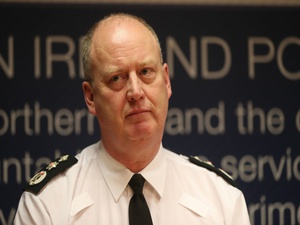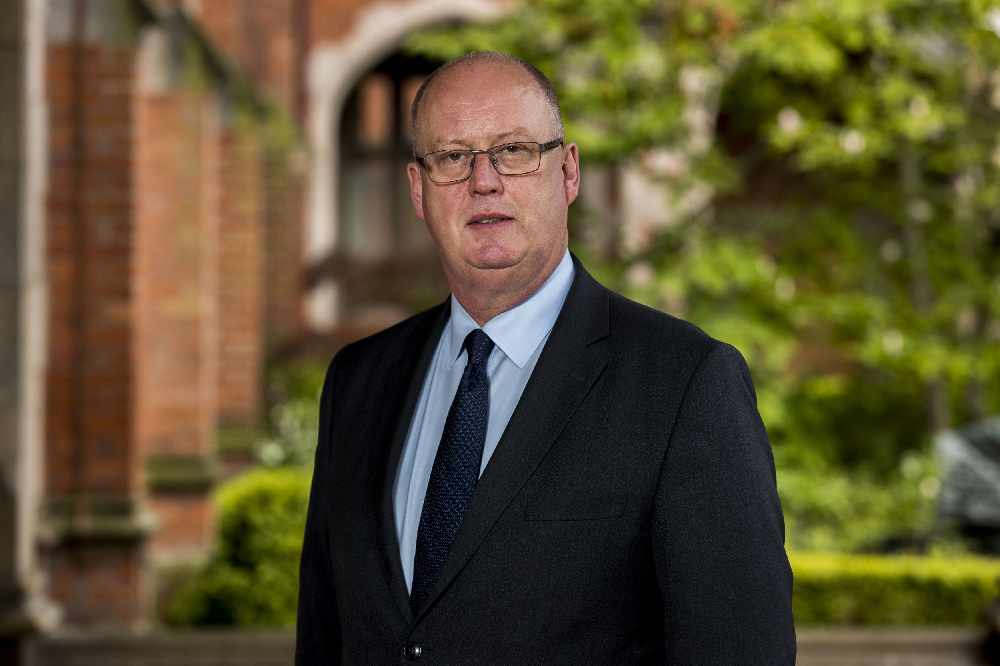
By Michael McHugh
Politicians are "shifting the blame" for the "stalling" peace process, the Police Service of Northern Ireland's chief constable has said.
George Hamilton said he was disappointed by public representatives who sympathised in private then publicly claimed there was no confidence in policing.
The departing chief of the PSNI said his work had been an at times painful experience, sometimes feeling part of progress but on occasion stuck or pulled backwards.
He said: "I therefore find it disappointing when politicians from all parties give me tea and sympathy on the issue in private but in public talk of our failures in dealing with legacy and how this has created 'rock bottom confidence' in policing or partisan policing by only pursuing state actors ... that is not effective accountability, that is point scoring - it is shifting the blame.
"What policing needs on this issue is political honesty and leadership to bring about solutions. Families need that leadership and honesty, too.
"I think it is a damning indictment, that in the ongoing political vacuum, members of grieving families are passing away without any resolution, without justice and without answers."
Legacy mechanisms to investigate wrongdoing during the 30-year conflict have not yet begun work.
Stormont power-sharing has been suspended for around two and a half years.
A fresh bid for political agreement began on Tuesday.

The chief constable said: "Across the political spectrum, those who should bear responsibility for supporting further progress have too often defaulted to the blame game.
"They have retreated to their respective bunkers, finding it easier to blame the police without taking any responsibility for the context in which police are being asked to operate."
Mr Hamilton expressed frustration at the collapse of his scrutiny body, the Policing Board, along with the devolved institutions.
He addressed a meeting at Queen's University Belfast with his reflections on policing with the community.
Mr Hamilton is in his final two months as chief constable and said there was still little sign of progress.
He added: "A restored (Stormont) Executive would have the opportunity, and I believe the community support, to take brave steps to reset our transformation agenda.
"I believe the learning we have gained over the last 20 years would allow us to be more ambitious about what we can achieve."
Last month journalist Lyra McKee, 29, was shot dead by dissident republicans in Londonderry.

IMAGE: Lyra McKee was murdered by the 'New IRA' in the Creggan estate in Derry - Londonderry in April
She was a champion of inclusivity killed by young men lost in the margins of Northern Ireland's new beginning, the chief constable said.
Following her death challenges had rightly been laid at the feet of political leaders to break the deadlock, Mr Hamilton said.
He said there must be no underestimation that action and a resolution to the outstanding issues is badly needed.
"Long before Lyra was murdered there was a sense that the peace process was stalling," he said.
Ms McKee was shot by a gunman aiming to kill police.
Mr Hamilton said: "One of the officers there that night was also the first on the scene of the bomb outside the (Derry) courthouse in January.
"Without a thought for his own safety, he began to evacuate people from the area. Windows blew in around him when the bomb exploded.
"Another of the other officers there that night had saved the life of a man who was involved in a car crash in the city, while two other officers had helped to save a life at the Foyle Bridge.
"Earlier this year, a number of the officers prevented serious harm when they searched and recovered guns and blades at a grave yard in Park, just outside of Derry, while others have been involved in taking at least £200,000 of drugs off the streets of the city."


 O’Neill praises Pope’s commitment to peace as she confirms funeral attendance
O’Neill praises Pope’s commitment to peace as she confirms funeral attendance
 Woman suffers ‘traumatic ordeal’ in roadside robbery in Newry
Woman suffers ‘traumatic ordeal’ in roadside robbery in Newry
 Shock over record number of attacks on ambulance crew
Shock over record number of attacks on ambulance crew
 Police investigate petrol bomb attack at Co Antrim flat
Police investigate petrol bomb attack at Co Antrim flat
 Benn to discuss legacy issues with Harris at Hillsborough Castle
Benn to discuss legacy issues with Harris at Hillsborough Castle